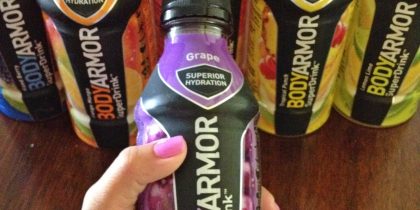We all need tips.
No matter how long we’ve been managing food allergies or been in a gluten free diet due to celiac or other autoimmune diseases, I know you will all agree that there are still many things to learn about this lifestyle.
With that in mind, this month, I asked a gluten free blogger friend, Jenny Finke of Good For You Gluten Free to share her tips on healthy eating while managing food restrictions. Aside from maintaining a blog, Jenny is also a certified nutrition and health coach. So if you have questions like “Why am I still gaining or losing weight after going gluten free or allergen free?”, her article below will come really handy.
She even have a special treat for you. So read on and let me know what you think.

So many people associate “gluten free” with healthy, but I’m here to tell you that people following a gluten free diet aren’t always the healthiest bunch.
Why?
Gluten free people hardly change the way they eat. They still eat bread (just gluten free bread). They still eat pasta (just gluten free pasta) and they still eat cakes and cookies (just gluten free cakes and cookies). You get the picture.
What happens is they start eating foods that are rich in sugar, white refined grains ans starches like rice flour, tapioca flour, corn starches etc. In other words, they continually eat nutritionally devoid foods – except this time they are eating nutritionally devoid gluten free foods! A lot of people who go gluten free might even gain weight!
On the other end of the spectrum, you have people who are riddled with food allergies and follow very restrictive diets. One of my dear friends has children who cannot eat gluten, soy, dairy, eggs or corn. It is hard for her to find foods her kids like. People who follow ultra restrictive diets often miss out on nutrient-dense foods, as well as trace vitamins and minerals found in a well rounded diet. A lot of people who follow restrictive diets might even lose weight and are often nutrient deprived.
Here are a few tips to eating healthy no matter what your diet is.

Skip Packaged and Processed Foods
The grocery aisles are filled with packaged and highly processed foods that may sound good for you at first – but I assure you, they are not! Just because something is labelled gluten free, dairy free, soy free or whatever free doesn’t mean it is good for you.
In fact, it is likely that the ingredient list contains lots of refined grains and is loaded with sugar too. Get smart about label reading or skip the packaged foods aisle all together.
Focus on eating naturally gluten free foods or foods without label like leafy green, whole grains, animal and vegetarian proteins and healthy fats (more on this later).
Cook at Home instead of Eat Out
Make this the year to cook at home and eat right! When you cook at home you enjoy more quality ingredients. When you eat fast food or even at a restaurant, you eat whatever is prepared for you (and put your body at risk for gluten and other allergens).
Most restaurants serve up low quality meats, fried foods and very few fresh vegetables. They make whatever is fast and cheap.
Make Vegetables the Star of your Diet
Focus on getting nutrient density in your diet. To do this, fill half of your plate with vegetables, and then have a small portion of protein and whole grains with every meal. Another way to get more nutrient-dense foods in your diet is through juicing. When you juice, your body quickly absorbs and assimilates 99% of the nutrients without having to do any of the labor intensive digestive work.
Load up on Healthy Fats
The low fat diet craze was built on a shaky science. Today, we know that healthy fats or food loaded with omega-3 fatty acids, are essential to energy, brain function and keeping inflammation away. Make sure your allergen free diet includes of healthy fats like wild caught salmon (if not allergic), avocados, flax seed or even a little dark chocolate.
Go Organic
Our food supply is tainted with overly processed foods created in a lab by food scientists. It’s loaded with artificial ingredients, cheap subsidized ingredients, trans fats, preservatives, genetically modified organisms, chemicals, pesticides, growth hormones and antibiotics. When you choose organic ingredients, you avoid these sick food-like substances that often sabotage our health.
Go Outside Each and Every Day
Vitamin D is essential to our immunity, mood, brain function and overall health. Yet, some experts say that 90% of Americans are vitamin D deficient. Our bodies convert sunshine into Vitamin D (which is actually a hormone). The best and most important way for us to get sufficient vitamin D is to spend about 10-15 minutes in the sun without sunscreen.
Casual sun exposure is sufficient and if you are going to be out in the sun for more than 10-15 minutes, be sure to wear sunscreen to protect your skin from the sun’s damaging rays. (Consult with your doctor to find the right amount of sun for you.)
Mind your Gut Health
Your body is filled with trillions of gut bacteria… and guess what, those gut bacteria are in charge. Yep, gut bacteria are in charge of your whole body health, so make sure your gut health is in check. You can do this by avoiding sugar and white, refined grains (which feed bad bacteria) and loading up on anti-inflammatory, nutrient dense foods. Even consider adding a probiotic or fermented foods in your diet.
I know being on a restrictive diet can be difficult especially for children. It’s hard to eat out and find foods you like. But you have a great opportunity to re-learn what healthy eating is all about. Cook at home (vs. eat out), choose naturally gluten free foods (like fresh produce, lean meats and whole grains) and focus on healing from the inside with strategies like juicing.
Remember, being healthy while following a restrictive diet should be about what you CAN’T eat; rather it is about what you CAN eat. Food is our fuel to keeping us healthy and ensuring we feel our best selves at all times. After all, health is wealth.
Did you like Jenny’s tips? Well, she’s giving special gift just for you TFMFriends. You can download her FREE Guide to Decoding Food Labels. If you ever wondered what’s the difference between cage-free or free range eggs, or what claims like healthy, natural, organic meat or if there’s still gluten lurking in foods labeled “gluten free”, you’ll want to check out this guide. Click here to get it.
You can also follow her on Facebook, Twitter, Instagram and Pinterest to get more of her tips and tricks.









.png)
